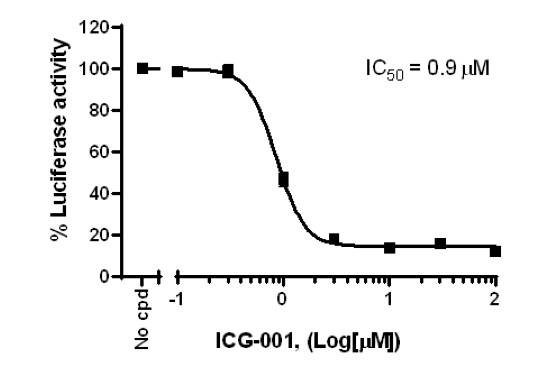Myc Luciferase Reporter HCT116 Cell Line
The Myc Luciferase Reporter HCT116 Cell Line is a HCT116 cell line expressing firefly luciferase under the control of Myc responsive elements. These cells contain a mutated APC gene, which leads to the aberrant accumulation of β-catenin and constitutive expression of Wnt-responsive genes by the transcription factors TCF/LEF (T cell factor/lymphoid enhancer factor family) and CBP (Creb-binding protein).
The transcription factor Myc is an early response gene that is over-expressed as a result of β-catenin signaling in HCT116 cells, leading to constitutive expression of the Myc-dependent luciferase reporter. The cell line is validated for inhibition of Myc activation by ICG-001, an inhibitor of β-catenin/CBP-mediated gene transcription.

Figure 1: Illustration of constitutive luciferase expression as a result of APC mutation and aberrant β-catenin signaling in Myc Luciferase Reporter HCT116 cells.
Created with BioRender.com
Interested in screening and profiling inhibitors or activators of myc-dependent signaling without the need to purchase and license the cell line? Check out our Cell Signaling Pathway Screening.
This product has been cited 5 times.
Purchase of this cell line is for research purposes only; commercial use requires a separate license. View the full terms and conditions.
Media Required for Cell Culture
| Name | Ordering Information |
| Thaw Medium 7 | BPS Bioscience #60185 |
| Growth Medium 7B | BPS Bioscience #79545 |
Materials Used in Cellular Assay
| Name | Ordering Information |
| Assay Medium 7B | BPS Bioscience #79718 |
| ICG-001 | Selleckchem #S2662 |
| ONE-Step™ Luciferase Assay System | BPS Bioscience #60690 |
| 96-well white clear-bottom cell culture plate | |
| Luminometer |
The cell line has been screened to confirm the absence of Mycoplasma species.
Myc is a family of three transcription factors that controls cell proliferation, differentiation, transformation, and apoptosis. Translocation of the gene encoding c-Myc contributes to the development of Burkitt’s lymphoma, whereas up-regulation of Myc genes has been observed in various human cancers including cervical, ovarian, breast, lung, and colon carcinoma. The aberrant expression of c-Myc in colon cancer is often due to an oncogenic mutation in the APC gene, which results in constitutive β-catenin/CBP-mediated gene transcription of the gene encoding c-Myc.
Pelengaris S, et al. 2002, Nat. Rev. Cancer. 2(10): 764-76.
Rennoll S, Yochum G., 2015 World J Biol Chem. 6(4): 290-300.


